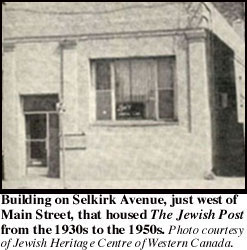
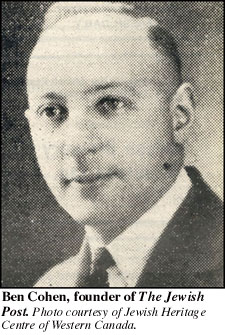
It was a time of vaudeville and silent movies, woodstoves and iceboxes, streetcars and model-T cars. Peddlers with wagons delivered bread and milk door to door.
Fourteen thousand Jews lived in Winnipeg's North End. Immigrants from Eastern Europe and their offspring, almost all of them spoke Yiddish. The lives of the fathers and grandfathers centred around the synagogues, with more than a dozen houses of worship in the North End, alone. But younger generations were already speaking English, and many were abandoning a religious way of life for Labor Zionism, socialism and other leftwing causes.
That was the era in which The Jewish Post was born. Established in 1925, the paper was the second anglo-Jewish weekly in Canada. (The Israelite Press, Winnipeg's Yiddish-language weekly, tried publishing an anglo-Jewish weekly called The Guardian in 1920, but it lasted only half a year.)
Ben M. Cohen was the founder of The Jewish Post. He'd been working as a printer for The Israelite Press, and had started his own printing company, Empire Press.
Cohen was a short, excitable man who talked quickly, and was always coming up with new ideas for expanding his printing business. 
In those days, the notion of publishing an anglo-Jewish weekly was "almost a sacrilege," said Leo Lezack, a later owner of The Jewish Post.
"But Ben Cohen had a vision." He saw that the number of Jews speaking English in Western Canada was increasing, and "the trend was toward an anglo-Jewish press."
Early editors of The Jewish Post worked part-time, and some were university students.
Issues of The Jewish Post in the 1920s had editorials dealing with themes like assimilation, the increasing number of young Jews desecrating the Sabbath, and other concerns of the day.
There were long dispatches reporting about the situations of Jews in communist Russia and Palestine, and social notes about Winnipeg's Jewish community, but few pictures, and relatively little advertising.
Getting ads for an anglo-Jewish paper in Winnipeg in those days wasn't easy. Fresh out of law school, Justice Samuel Freedman worked for The Jewish Post in the summer of 1930, soliciting ads for the Jewish New Year's issue.
Freedman had been advertising manager of the University of Manitoba yearbook, and found it relatively simple to get businessmen to run ads in that publication. But trying to sell ads for The Jewish Post was "almost like battling against a stream," he recalled. 
The Jewish Post also faced intense competition from a rival anglo-Jewish weekly. Founded in 1926 by a young lawyer named Sam Berg, The Western Jewish News engaged in a fierce struggle with The Jewish Post for advertising.
Ed Parker of Toronto, whose father Harry co-founded The Israelite Press, recalled that advertising salesmen for The Jewish Post and Western Jewish News would crisscross Western Canada, trying to get ads for their papers' huge holiday issues. The holiday ads were the key to the papers' survival.
The salesmen "would race each other so one would get to a town before the other," Parker said. "Woe betide any salesman" who approached a smalltown business for ads after the representative of the other paper had already been there. Dave Corne, a longtime owner and ad salesman for the Western Jewish News, was built like a football player.
"He never threatened," Parker remembered. "But the physical size of the man!" "Do you want to offend the Jewish community?" Corne would ask businesses. "If not, put in an ad!"
Sometimes both papers would also run ads from businesses without authorization, said Harry Gutkin, author of Journey Into Our Heritage, a History of Jews in Western Canada. "Most of the time, the advertisers paid up."
The Jewish papers of Toronto engaged in the same questionable tactics, Gutkin adds. "It was a matter of survival."
Over the years, The Jewish Post moved to new premises several time. For decades, it was located in a one-story building on Selkirk Avenue, just west of Main Street.
"There was a very small front office with two cubbyholes, and a print shop behind that," recalls Mildred Gutkin, editor of the paper from 1944-45. The Jewish Post later moved to Main and St. John's, and later, to a strip mall in Inkster Industrial Park, where it's still located. 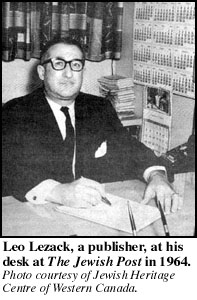
Leo Lezack was involved with The Jewish Post for more than 40 years, from 1929 to the early 1970s. He started off as an ad manager, later became co-publisher, and eventually owned the paper outright.
"We took pride in recording the pages of history of the Jewish community of Winnipeg and Western Canada," he said. "We were very zealous about the way we did it."
But others were less charitable. Sam Drache, an elderly Jewish lawyer who was a friend of early Jewish Post publishers, maintained that both anglo-Jewish papers in Winnipeg were little more than "a kind of bulletin board for what was going on in town. They certainly had no independence, editorially," because they didn't want to offend any Jewish organizations or advertisers.
Mel Fenson, an American who married a Winnipeg girl, became editor of The Jewish Post in the late 1940s, and served in that role for nearly a decade.
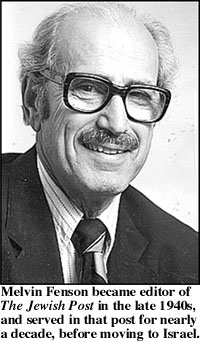
He was also co-publisher of the paper with Leo Lezack for several years.
"Mel Fenson was a topnotch editor," Lezack recalled. "He had a great mind."
Sam Drache remembered Fenson being "Involved in communal affairs. He would get to know what was going on in town. Fenson was the first one who actually reported on things."
Rupert Shriar served as editor of The Jewish Post from 1959 to 1967, and later, as associate director of Toronto Jewish Congress and in other jobs.
Then as now, Winnipeg's Jewish community was very closeknit. Jewish organizations were very sensitive about how Shriar was portraying them in the paper, and frequently pressured him to write editorials backing their fundraising projects or other causes.
"If you feel you're a community paper, you've got an obligation to do that sort of thing," he maintained.
Lee Schacter served as editor from 1967-68. She had been writing freelance for the Free Press and other publications.
"Leo Lezack phoned and asked if I would like the job," she said. "I nearly fell over. My husband (Phil) was going to law school. I had young kids. He paid me $100 a week, more than I'd ever earned in my life."
"I used to love doing the editorials," Schacter remembered. One that raised a particular storm dealt with how parent were being forced to drop their small children off in the back lane behind Talmud Torah when giving them rides to school.
"I concluded that it was really hazardous...People were calling in and cancelling subscriptions" as a result of her editorial. "Others phoned in with messages of suport. But the publisher (Leo Lezack) stuck behind me. I thought he would fire me on the spot." 
In 1973, an editor had just quit and Harold Markusoff, then co-owner, was "deperate," recalled Bess Kaplan, an internationally-
renowned fiction writer. Although she was then writing a novel, she agreed to take the job because The Jewish Post was then on Main and St. John's, only a few blocks from her house.
Kaplan loved to write editorials blasting the PLO and other enemies of Israel. "My editorials were guaranteed to get everybody's blood boiling."
Working conditions at The Jewish Post were less than ideal in those days.
"I have a clothes closet bigger than the office I had at The Jewish Post," Kaplan remembered. "The phone was always ringing. People would come into my little closet office coughing, sneezing, blowing cigar smoke in my face."
As a result, she did most of her writing at home.
Martin Levin brought The Jewish Post to new heights as editor, from the mid-1970s to early 1982.
He increased the paper's reporting on community affairs, introduced new columnists and wrote eloquent editorials that won three Smolar Awards, then the top prizes for writing in Jewish papers in North America.
Throughout the 1970s and '80s, The Jewish Post steadily improved, said Sam Drache, now deceased, then a regular reader of the paper. Among other changes, it wasn't as afraid to be controversial, and take strong stands editorially. 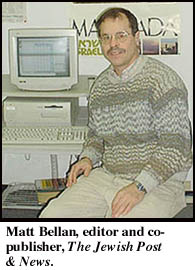
Matt Bellan, then a reporter for three years for The Leader-Post in Regina, was hired in 1982 to replace Levin as editor, after Levin moved on to a job with a local seniors' paper. Levin in the late 1990s won new distinction - The Globe and Mail hired him as its book section editor.
Bellan, his brother Bernie, and advertising salesperson Gail Frankel bought the paper in 1984, from Bill Wong, who'd co-owned the paper with Harold Markusoff until Markusoff died that year.. Bernie Bellan became business manager, and Frankel, advertising manager - a position she held until moving on to ad sales for The Winnipeg Sun more than 15 years later.
The three new owners bought the then-faltering Western Jewish News in 1996, and merged the two longtime Winnipeg Jewish weeklies, renaming the new publication The Jewish Post & News.
Over the years, Bernie Bellan pioneered new sources of revenue for the paper, including starting monthly mass mailings to the whole Jewish community, Lifestyles, a general interest publication mailed out to the Jewish community and non-Jewish residents of several south Winnipeg neighborhoods, and other larger-distribution publications. 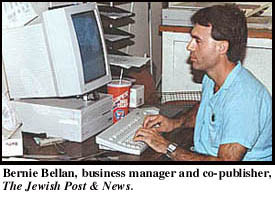
Matt Bellan today remains editor of The Jewish Post & News, with Bernie as business manager, Tove Silver, office manager, Diana Vincent, chief production person, and Robbie Mazo, advertising salesperson.
In 1992, The Jewish Post & News began weekly publication of eight pages of each issue in color. Winnipeg's Jewish weekly operates out of a fully modern set of offices at in Inkster Industrial Park, a few doors down from its earlier location at 117 Hutchings Street.
Production of today's paper, with e-mail transmission of stories and pictures, transfer of material to our printing company on zip disks and other innovations is a far cry from production methods only 20 years ago.
And with the launch of this website in 2003 and other innovations, we continue moving forward.
Click here to return to the top of this page.
Click on the "Return to main page" button at left to explore more of this website.